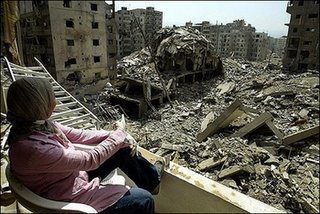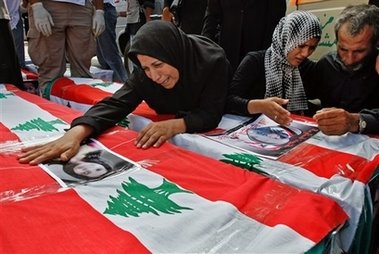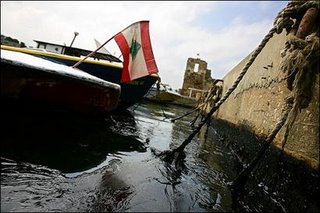
Dear World
August 17, 4th day of peace.
Peace is it? I wouldn't know.
They announced the ceasefire on Monday at 8:00 a.m. local time. And since then, I feel empty.
I don't know whether this is a dream or reality.
I don't know whether this month of war was a short nightmare, or, as a friend told me, that all these days of peace were just a long dream.
I am just wondering where I was the last month. Somewhere ugly, somewhere beautiful, I wouldn't know because most of the time I could not even feel myself. All I could feel was something constantly crumbling within me and a permanent heaviness I could barely drag behind me.
The war is over now, there's nothing to fear. And I don't want to believe it because I believed it once, I believed it for fifteen years and got betrayed again. I stopped trusting peace and gathered a permanent readiness for war situations, a permanent readiness for destruction and death. And it is okay, it can never go wrong.
Now, we don't see the Israelis bombing on television. They stopped bombing and we will not miss them. The refugees on my building's first floor have left. They all left from the moment fire ceased, ignoring the israelis' threats and the warnings from unexploded objects and potential bombs left behind in scary quantities and went back home.
Home sweet home. How sweet it is to find the four walls of your house gathered in mass of rubble that covers potential bodies buried underneath? This is the case of hundreds of families who, despite all that, bowed down the moment they reached their villages and kissed the soil. A soil more precious then ever.
Slowly, things are going back to normal. Slowly, televisions are re-integrating non-war shows such as translated Mexican movies that emerged as a great trend after the civil war. It is funny to see Mexican-moving lips, with an Arabic voice over along with my dear Flash News Grey Band (Yes, it's still alive) numbering the dead they found under the rubble today, the total number of war victims, along with what Junblat said, what Hariri said, what Lahoud said, what Olmert said, what Bush said, what Rays said, what Sanioura said, what Nasrallah said, what Asad said. So many people with so many things to say, it mesmerizes me because there is only one thing that needs to be said: that the world has officially gone crazy.
I am out of things to say, really. I am simply writing whatever is crossing my head. I simply hope that the violence is truly over. There was too much death and too much suffering, much more than anyone could have handled. Yet we have handled it and we are getting up on our feet, and it won't take long before we get along with our lives. Because, simply, life is the only thing we want and we won't give it up for anything.
I hope this is the last thing I write about the war. Whatever I have written before is useless now. Maybe at the time it was useful, but right now it is totally pointless. There is no point in looking back and regretting that we didn't do anything earlier. So better discard them or read them as a story, a fiction. This is all they are now, a fiction.
This is all this war is now, a fiction.
1300 dead so far, but families are still lying under the rubble, bodies waiting to be uncovered and buried.
Slowly, the world will forget. We will just be another set of numbers, a grey memory everyone avoids to remember, a set of dates and events in some history book that a child memorizes late at night because he has to, not because he wants to.
But we will not forget. This war has been imprinted in the deepest level of our senses and even if someday our mind decides to discard it, fireworks will still traumatize us, and television Flash News will still carry the mesmerizing threat they have been carrying for the past month.
Outside, the generator is still on. And even if someday electricity is granted all day and night, my dear generator will still be waiting outside, just in case the city goes dark again. And I will hear its roaring once again, this soft roaring that has now become my silence.
I hope nobody ever experiences what we have experienced this past month.
But somewhere, I hope you do, if you have the nerves for it. There's nothing more interesting that seeing the world madness eating you up, and then slowly receding… or not. How would I know?
All that I know, is that I know nothing.
With Love,
Hopefully my last post
A Lebanese Citizen
 Israel should stop humilating Lebanon Warning of a “race against time” to rebuild Lebanon after the recent devastating month of conflict, the United Nations Deputy Secretary-General today urged donors to provide funds for the task, as he repeated calls for Israel to lift its air and sea blockade, saying it severely hinders relief efforts.
Israel should stop humilating Lebanon Warning of a “race against time” to rebuild Lebanon after the recent devastating month of conflict, the United Nations Deputy Secretary-General today urged donors to provide funds for the task, as he repeated calls for Israel to lift its air and sea blockade, saying it severely hinders relief efforts.










